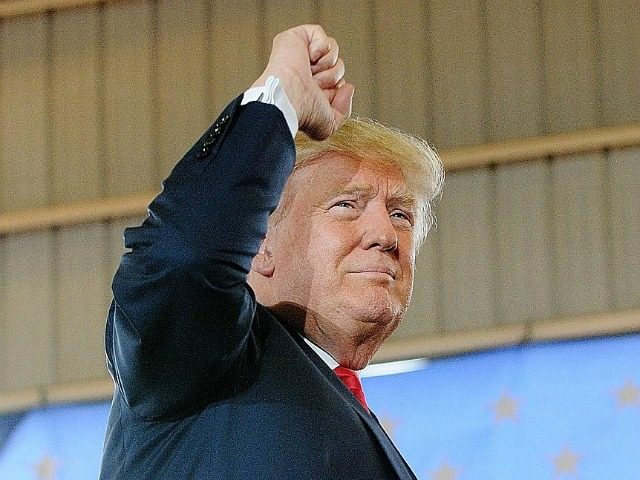Republicans should take a page out of Donald Trump’s book if they want to stop losing and start winning on healthcare. They should be thinking, and talking, about “protection.”
How did Donald Trump come to be the Republican nominee, and then the president? Columnist Peggy Noonan suggests it had a lot to do with the idea of protection.
“There are the protected and the unprotected. The protected make public policy. The unprotected live in it. The unprotected are starting to push back, powerfully,” she wrote in February 2016, as Donald Trump became the presumptive nominee.
Indeed, the words “protect” and “protection” stood out during Donald Trump’s inaugural address, repeated seven times and carefully emphasized.
“There should be no fear – we are protected, and we will always be protected,” the new President said at one point.
“The establishment protected itself, but not the citizens of our country,” he insisted at another.
“Protection will lead to great prosperity and strength,” he stressed again.
Their message is falling flat. Just 16% of Americans say the House GOP’s health-care bill is a good idea, according to an NBC News/WSJ poll, and just 12% support the Senate Republican health care plan, according to a USA TODAY/Suffolk University poll.
Former House Oversight Committee Chairman Jason Chaffetz (R-UT) found himself in hot water recently when he responded to questions about the House health care plan by stressing “self-reliance,” and suggesting that lower-income Americans should “invest in their own health care,” “make a conscious choice,” and prioritize buying health insurance over “getting that new iPhone that they just love.”
Ok, fine, Mom. But we’re far past that point in the debate now. As Byron York observed this week, Ted Cruz was correct in October 2013 when he warned that once Obamacare’s subsidies and benefits began to flow on January 1, 2014, there would be no turning back.
“[Obama’s strategy is very simple: He knows that in modern times no major entitlement has ever gone into effect and been unwound. Never been done. His strategy is to get as many Americans as possible hooked on the subsidies, addicted to the sugar,” Cruz had told an audience in August of 2013. “I think if we’re going to stop Obamacare, we have to do it now,” Cruz continued. “If we get to January 1, this thing is here forever.”
Republicans are now finding that it is very hard to repeal Obamacare, York notes, because, doing so “would be taking back something the government had already given to millions of Americans.”
Republican arguments about freedom and choice and self-reliance are never going to beat Obamacare’s messages of subsidies, stronger coverage, free preventive care, capped out-of-pocket spending, and equal treatment for people with preexisting conditions.
But Trump’s idea of “protection” just might.
Sure, people know they could eat more healthily, exercise more, or put more money away in a health savings account. But what most people really fear is being hit by something completely outside their control — receiving a diagnosis of cancer or Parkinson’s Disease; suffering a sudden stroke; having a baby with severe health problems; or supporting a twenty-year-old child with depression and an opioid addiction.
When their worlds come crashing down around them, people want to feel protected. Republican promises of state high risk pools don’t quite meet the bill.
Arguably, even Obamacare fails on that score. 27 million people remain uninsured under Obamacare, and most people with insurance still receive it through an employer, and could experience a disruption in coverage if they change jobs.
That spotty system, with its complex web of mandates and rules, came at astronomical cost to the federal government, and involved enormous disruption to the health insurance market.
Yet it will be impossible to replace Obamacare with a plan that merely shrinks it a bit. Any plan to take away benefits, reduce subsidies, or make them available to fewer people is bound to fail. The only thing that could successfully replace Obamacare at this point is a broader (though less expensive or intrusive), bolder, better, and more beautiful entitlement. Something less Republican and more Trumpy.
What might a Trumpian health plan look like? It is not too hard to imagine.
A full repeal of the Obamacare, a free market in health insurance, plus coverage for all — specifically, a universal, single-payer catastrophic coverage plan of the kind proposed by Dana Goldman and Kip Hagopian, described here and here.
For the record, their proposed plan is more generous than what most people think of when they hear the words “catastrophic coverage,” and could include coverage for several primary care visits each year, prenatal care, and treatments for several chronic diseases. The deductible for each individual’s policy would be means-tested — just as almost every other social welfare program in the U.S. (or about 79 of them) provides assistance based on need. It could cost significantly less than Obamacare.
At the same time, people would be encouraged to use health savings accounts, and they would be able to purchase a supplemental insurance plan from among the wide range of options the market would be sure to provide.
Such a plan would fulfill every one of Trump’s campaign promises.
Repeal and replace Obamacare? Check.
Restore the free market? Check.
Cover everybody? Check.
And—most importantly—protect the citizens of our country? Check.

COMMENTS
Please let us know if you're having issues with commenting.